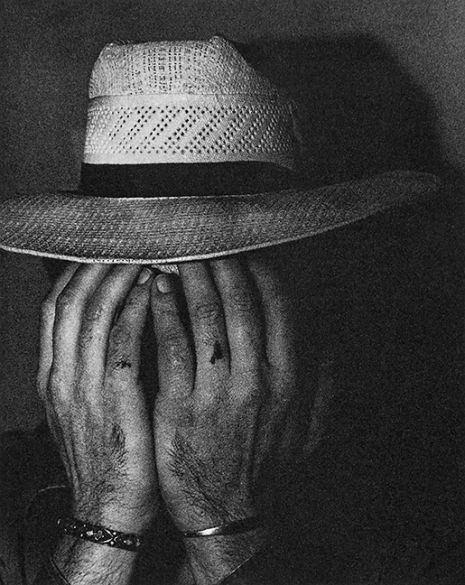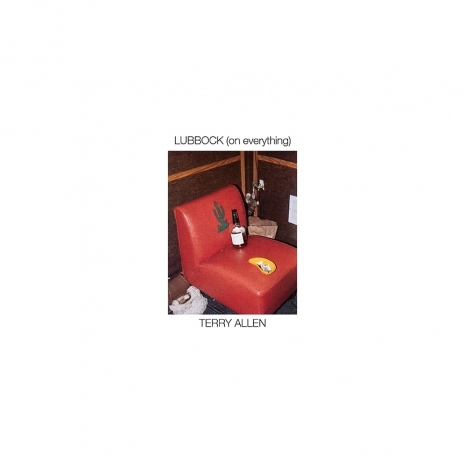
David Byrne writes on influential artist and “alt country” pioneer Terry Allen‘s classic 1979 album, newly reissued by Paradise of Bachelors.
A SLEEPING BAG IN THE WEST TEXAS SCRUB: Reflections on Lubbock (on everything)
Well, I’m here in NYC, chopping onions, and “Amarillo Highway” is playing—so I’m dancing and singing and crying all at the same time. It doesn’t get much better.
I once hitchhiked cross-country and got dropped off on that Amarillo Highway, just as it was getting dark, and a little cold (it’s the High Plains). I was tired, and it was the middle of nowhere (I was not in town), so I walked out into the West Texas Plains scrub and just pulled out a sleeping bag and lay down. That’s a way of saying that highway draws up some pictures in my mind.
So does Lubbock—it must have been 1979 the first time Talking Heads played there, and someone had made a banner to hang by the stage that said in big letters “this ain’t no disco.” These, as some might recall, were the days when disco was viewed as formulaic factory-made music that was threatening “real” music—rock or country, or whatever. The sign had nothing to do with the subject of the song— an imaginary scenario where urban warfare breaks out in the U.S.A., and the singer realizes the revolution is more important than nightclubbing. Whatever. I was a little confused—I liked some disco music!—but I kept mum about that, as I perceived it was meant as compliment.
So … years later … like the instrumental time segue in “The Wolfman of Del Rio” and the one in “The Girl Who Danced Oklahoma” (he does it twice!)…. I was living in L.A., and like many who wash up there, I had aspirations to make a picture. A writer I admired said, “You need to meet Jo Harvey Allen and listen to Terry’s music!” I took that advice. There was some hilarious miscommunication—I think when we first met, in Fullerton, I wrote my contacts on a McDonald’s bag that Jo Harvey promptly threw out. I persevered; I loved her show As It Is in Texas, and by then I was addicted to Terry’s music.
What was Mr. Psycho Killer doing there? The answer is self-evident—listen to this music. Why did Joe Strummer and Terry’s friend Joe Ely become fast friends?
Fast forward… we all became great (if sadly often long distance) friends. I never thought much about it—it all seemed as natural as breathing—but later I realized that, although Terry and I come from different worlds, we do a lot of the same things—music, theater, art—with complete disregard for definitions and boundaries. It all made perfect sense to me, but it didn’t always make life easy, as not everyone gets that. Terry has navigated those waters (or highways, I guess I should say) with skill and maybe some West Texas dance moves, managing to avoid some of the rocks and perils that are strewn about such a hairy career path.
Anyway, back to the record. Terry sometimes sings from his own, or what I assume to be his own, POV—his commentary on Joe Bob, the local football star who “goes bad,” is Terry’s version of schadenfreude, as is “Truckload of Art,” a well deserved comeuppance. “Oui” lays out the painful dilemma many a struggling artist or musician has to consider. But just as often Terry is singing from the POV of the character in the song—like the braggart in “Amarillo Highway.” And sometimes he sings in the third person too—he describes what someone in the song does or feels, and suddenly we’re watching them, watching from Terry’s West Texas vantage point … watching the waitress or the kid who gets his first “release” (took me a while to figure out what that meant!) on “that vinyl tuck and roll.” They’re all described with tender, loving sarcasm, which is a default with Terry. You know you’re OK when he starts seriously teasing you.
The music—first of all, God bless Lloyd Maines, whose hands are all over this album. Secondly, having sat in with Terry more than once, I know that these songs are not as easy to play as I, for one, might have assumed. Sometimes there is an “extra” bar, and sometimes there’s an “extra extra” bar, as the music often follows the lyrics and the peculiar phrasing of the singer. Terry is a storyteller, after all, and the cadence and timing of the words cue the punchlines. Though the music might be vernacular—a mix of country, Latin, and Texas rock—he blends those genres to fit his own ends. It’s familiar sounding, but at the same time something’s off, and that something is what intrigues; it’s what keeps you paying attention.
I’ll point out that there are Latin rhythms present in some songs—not that surprising, as Buddy Holly, that other son of Lubbock, did the same. The Latin and Mexican tinge is ever present in music of all types from that part of Texas. It is absorbed and becomes part of the songwriting and musical grammar of everyone who emanates from that region. It adds a lilt and swing and some ironic references as well (e.g., cocktail lounges) … it adds to the meaning of the songs. The border is fluid, when it comes to music at least.
These songs were written and recorded quite a while ago— so how do they hold up? Pretty damn well, I would say, but I’m not an impartial judge. Musically, this record could have been made this year—“Americana,” it’s called now—and it would be judged an amazing record still.

What does the title mean? To me it means that Lubbock, the town where (this is not my joke) it’s so flat, if you stand on a chair you can see your own backside, is like a sauce that flavors all of these songs. What’s the leather chair on the cover mean? I don’t know. There have to be some mysteries left unexplained, I guess.
So if you’re reading this, it’s too late—my words can’t convince you to buy the album. But maybe I can convince you that appreciation for Terry’s art, and this is surely art, is widespread. It goes well beyond Texas. In my opinion it’s art that uses a popular form, hijacks that accessibility and familiarity, and says things you’d never expect those forms to say. This is not regional music or regional art—it touches folks cutting onions (now sautéed) here in NYC and wherever folks’ ears and hearts aren’t stuck in a rut.
—David Byrne, 2016





